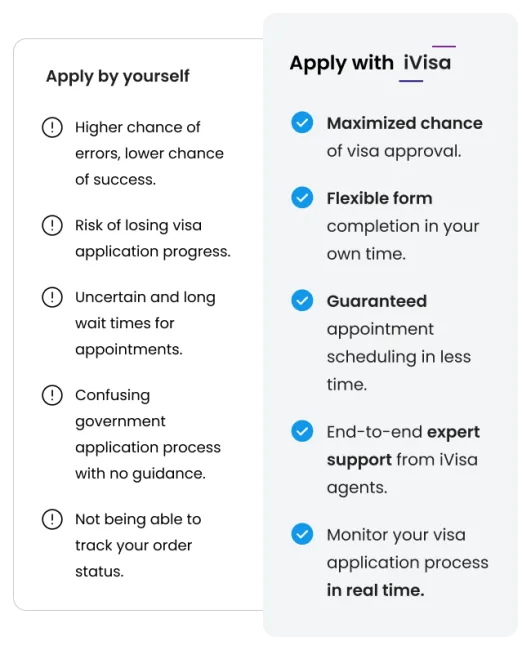Portugal ETIAS: Join the waitlist!
Last updated: September 2023
Starting in 2024, non-EU travelers from visa-exempt countries aiming to explore Portugal will have a new requirement: the ETIAS.
Picture this: you're ready to meander through the cobbled streets of Lisbon's Alfama district or relish the panoramic views from the cliffs of Cabo da Roca. Well, there's an added layer now. Instead of direct visa-free access as before, travelers from these specific countries must secure an ETIAS authorization to truly enjoy both Portugal and the broader Schengen Area.
This guide will shed light on the ETIAS process, highlighting application procedures, eligibility criteria, and the costs involved.

What is the Portugal ETIAS?
The European Travel Information and Authorisation System, commonly referred to as ETIAS, is an upcoming electronic travel authorization designed for Europe. This initiative represents a significant advancement in travel security for the continent.
The ETIAS initiative was set in motion back in 2016, as European leaders recognized the need for a more comprehensive system than mere passport checks. This new system provides a more detailed overview of visa-free visitors, ensuring strengthened border security.
Because Portugal is a Schengen member state, visa-exempt travelers must first obtain a Portugal ETIAS before entering the country.
What can I do in Portugal with an ETIAS travel authorization?
The ETIAS grants access to Portugal and the Schengen Zone for:
-
visiting family or leisurely activities
-
business endeavors such as conferences or meetings
-
academic pursuits up to 3 months in duration
-
medical procedures.
What can I not do with the Portugal ETIAS?
With the Portugal ETIAS, you're not allowed to:
-
engage in studies that span over 3 months
-
seek employment
-
establish permanent residence in Portugal.
Who can apply for the Portugal ETIAS?
The Portugal ETIAS is tailored for individuals from nations with visa-free privileges to Europe and the Schengen Area.
Travelers without a visa must secure the ETIAS authorization for entry to the European nations listed below:
| Austria | Germany | Netherlands |
|---|---|---|
| Belgium | Greece | Norway |
| Bulgaria | Hungary | Poland |
| Croatia | Iceland | Portugal |
| Cyprus | Italy | Romania |
| Czech Republic | Latvia | Slovakia |
| Denmark | Liechtenstein | Slovenia |
| Estonia | Lithuania | Spain |
| Finland | Luxembourg | Sweden |
| France | Malta | Switzerland |
To qualify for ETIAS, you must meet these requirements:
-
You don't hold an EU citizenship.
-
Your country maintains a short-term visa waiver agreement with ETIAS-requiring European nations.
-
No EU country has granted you a residence card, permit, or an equivalent status.
Who is eligible for the Portugal ETIAS?
All visitors, irrespective of age, from outside of Europe who have visa-free access to Europe, Portugal, and the Schengen Zone must acquire an ETIAS.
Here is a complete list of the countries eligible for the ETIAS travel authorization:
| Albania | Hong Kong | Saint Kitts and Nevis |
|---|---|---|
| Antigua and Barbuda | Israel | Saint Lucia |
| Argentina | Japan | Saint Vincent |
| Australia | Kiribati | Samoa |
| Bahamas | Macau | Serbia |
| Barbados | Macedonia | Seychelles |
| Bosnia and Herzegovina | Malaysia | Singapore |
| Brazil | Marshall Islands | Solomon Islands |
| Brunei | Mauritius | South Korea |
| Canada | Mexico | Taiwan |
| Chile | Micronesia | Timor Leste |
| Colombia | Moldova | Tonga |
| Costa Rica | Montenegro | Trinidad and Tobago |
| Dominica | New Zealand | Tuvalu |
| El Salvador | Nicaragua | Ukraine |
| Georgia | Palau | United Arab Emirates |
| Grenada | Panama | United Kingdom |
| Guatemala | Paraguay | United States of America |
| Honduras | Peru | Uruguay |
| Vanuatu | ||
| Venezuela |
ETIAS-exempt: Who doesn't need to apply for a Portugal ETIAS?
Those with EU citizenship or residency are exempt from the Portugal ETIAS requirement. They can move effortlessly throughout Portugal and the Schengen area with just their passport or national ID.
If you already have a valid Schengen visa, you don’t need to apply for the Portugal ETIAS.
Can minors apply for a Portugal ETIAS?
Even minors from countries that enjoy visa-free privileges need to secure a Portugal ETIAS visa waiver before arrival.
A parent or the child's legal guardian can fill out and submit the ETIAS application for them. Remember, when applying for multiple minors, each one requires an individual application.
How long can I stay in Portugal with the ETIAS?
The validity of an ETIAS is 3 years or until the travel document used during the application expires, whichever comes first.
With a valid ETIAS, you're free to journey in and out of Portugal and other Schengen nations as many times as you want, as long as your cumulative stays don't go beyond 90 days within a 180-day span.
Can I extend my Portugal ETIAS?
An expired Portugal ETIAS isn't eligible for renewal. A new application is necessary.
And should your travel document expire before your ETIAS's end date, you will also have to apply for a new one.
Required documents for the Portugal ETIAS
Here are the necessary documents when obtaining an ETIAS:
-
A valid travel document – Typically, a passport should remain valid for at least three months beyond your planned departure date.
-
Completed application form – This will request details such as your birth date, nationality, your parents' names, educational background, current job, the first country you plan to visit, your stay's address, and any history of criminal convictions or visits to conflict zones.
If you're related to someone living in a European country requiring an ETIAS, it's essential to provide their specific personal information and clearly define your relationship with them.

How to apply online for the ETIAS Portugal
When the ETIAS system is up and running, securing it via our platform will be simple. Here's how to do it:
-
Step 1 - Provide your basic information and travel details on our website or the easy-to-use iVisa App. Choose your preferred processing time and pay the fees.
-
Step 2 - Fill out the ETIAS application form and upload the required documents.
-
Step 3 - Submit the form and wait for an email confirming the submission of your application, which will include your unique ETIAS application number.
After obtaining your ETIAS, make sure to have both a printed copy and a digital backup on your device. This will facilitate smoother transitions at airports and border control in Schengen countries.
Benefits of getting your Portugal ETIAS with us
Choosing our platform to secure your Portugal ETIAS ensures a hassle-free and prompt procedure. Here are the advantages of using our services:

Portugal ETIAS fees and cost
The Portugal ETIAS comes with a government charge of 7 euros (approximately $8). However, travelers below 18 or those over 70 are not required to pay this amount.
To enhance the ease of your application process, we recommend applying through our website. Be aware, though, there's an additional service fee for this added convenience.
Portugal ETIAS processing time
The majority of travelers obtain their ETIAS authorization in a short span, often within mere minutes. Nonetheless, in some cases, it can stretch to 30 days. Therefore, it's better to initiate your application well in advance of your intended travel date.
When the ETIAS is operational, you can easily apply for the travel authorization on our website. There will be three processing options available:
-
Standard processing time: Ideal if your travel dates are not immediate.
-
Rush processing time: A quicker alternative, albeit at a slightly higher cost.
-
Super rush processing time: Tailored for those under tight timelines.
Do remember that the time iVisa takes is separate from the processing duration of the Portuguese government.
Do transit passengers need the Portugal ETIAS?
Travelers exempt from visas who are transiting via Portugal don't need an ETIAS, provided they stay within the international transit zone of the airport.
However, if these travelers decide to step out of this zone and enter Portugal or any of the other 30 European countries that mandate an ETIAS, they must have this authorization.
Portugal entry requirements or restrictions
Portugal is prepared to welcome visitors without demanding rigorous entry requirements. There's no need for proof of COVID-19 vaccinations or related documentation. However, ensure you possess the following documents:
-
A current travel document, like a passport
-
An active ETIAS authorization or Schengen visa.
Differences between the Portugal ETIAS and the Portugal Schengen Visa
Understanding the distinction between a Portugal ETIAS and a Portugal Schengen Visa can be tricky. Firstly, it's essential to note that an ETIAS is not a visa. Instead, it's an electronic authorization, like the United States ESTA.
Below are some primary contrasts between an ETIAS and a Schengen visa:
-
Eligibility: An ETIAS is tailored for individuals who are presently visa-exempt for European travel. Conversely, the Schengen visa is for those who need a visa to visit European nations.
-
Application process: Applying for an ETIAS is an online process, needing just a valid travel document and essential details. In contrast, the Schengen visa application is lengthier and entails a more in-depth procedure, including providing essential documents like a travel itinerary and proof of employment. Applicants also undergo a face-to-face interview and provide biometric data.
-
Entry specifications: With an approved ETIAS, travelers can have multiple entries throughout its valid term. Whereas a Schengen visa might permit single, double, or multiple entries based on the sole discretion of an immigration official.
-
Format: An ETIAS is entirely digital and is electronically attached to a travel document. A Schengen visa is physically placed in a passport.
Who can I speak to if I have more questions?
If you have questions about the Portugal ETIAS, don't hesitate to contact our customer service team via online chat or through [email protected].
- Portugal Schengen Visa for Ghanaian citizens: Complete application guide for 2023
- Portugal Schengen Visa for U.S. permanent residents: Requirements and application online
- Portugal Schengen Visa for Nepalese citizens: Complete application guide for 2023
- Portugal Schengen Visa for Turkish citizens: Complete application guide for 2023
- Portugal Schengen Visa for Bangladeshi citizens: Everything you need to know
- Portugal Schengen Visa for Russian citizens: Everything you need to know
- Portugal Schengen Visa for Indian citizens: Requirements and application
- Portugal Schengen Visa for Lebanese citizens: Requirements and application
- Portugal Golden Visa: Requirements & How to Get One
- Portugal Passenger Locator Card error
- See All

 India Visa
India Visa
 Turkey Visa
Turkey Visa
 United States Visa
United States Visa
 Australia Visa
Australia Visa
 Colombia Visa
Colombia Visa
 New Zealand Visa
New Zealand Visa
 China Visa
China Visa
 Egypt Visa
Egypt Visa
 Vietnam Visa
Vietnam Visa
 Indonesia Visa
Indonesia Visa
 UK Passport Renewal
UK Passport Renewal
 CA Passport Renewal
CA Passport Renewal
 IE Passport Renewal
IE Passport Renewal
